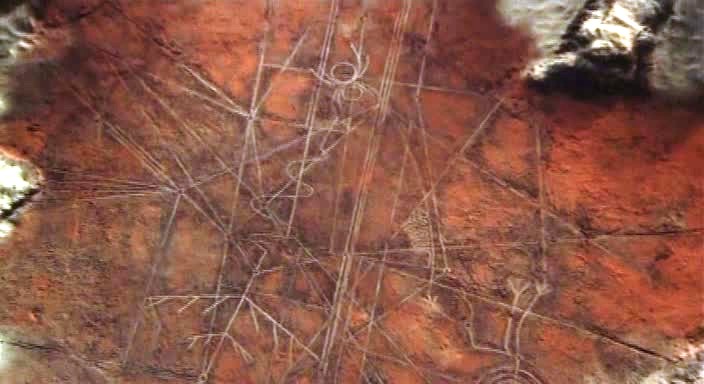
Imagine my amazement the other day while watching a rather annoying Japanese SF movie, Bye-Bye Jupiter (1984), in which the legendary Nazca lines in the Peruvian desert are referenced. It triggered me to write this first piece for our newly launched Unbelievable segment. What about those Nazca lines?
By Emad Aysha
The movie begins in the distant future, 2125, after man has colonised most of the solar system and is still desperate to move outwards in search of raw materials, living space, and energy. While melting Mars’ polar icecaps for terraforming purposes, they find Nazca lines have been argued to be exterritorial in origin.

CHEAP IMITATION: A screenshot from 'Bye Bye Jupiter'. Nothing quite like the real thing since the movie version is a roadmap to nowhere!
Decoding the lines on Mars, which date to 100,000 years ago, leads them to the eye of Jupiter, where they find a giant spaceship that’s already called the Ghost of Jupiter, with its ancient distress call.
The plot then takes an unnecessary twist when it’s discovered that a black hole is headed to the solar system on a collision course with the sun, portending doom for humanity.
As luck would have it, the Earth authorities had already been trying to create a new second sun via Jupiter to help the distant colonies that couldn’t get enough solar power. They had two years to ignite the gas giant and use it to deflect the black hole.
Then we’re told that the Nazca lines on Mars warned about this black hole, but they failed to figure out the language of the Ghost vessel in the eye of the storm. While they’re igniting the planet, the Ghost vessel screams out a message, which they again fail to decode.
So, what was the point of the original ancient alien's plotline? To make matters worse, they literally and figuratively have a Jupiter Church on Earth trying to mess up the plans to turn the gas giant into a sun.
They’re conservationists led by an end-of-the-world rock star. Even after finding out about the black hole, they persist in sabotage attempts, trying to escape to Mars as if they’ll be safe there.
If they wanted to end humanity to maintain the cosmic order, I’d understand, but here, they intend to keep on living. It’s bloody stupid. So how do you explain this sudden turn of events? With reference to the concerns animating Japanese science fiction.
Just the other day, I watched The War in Space (1977), an old childhood favourite. In it, you also have an alien race expanding into the solar system after their own planet begins to die.
They use Venus as a launching pad for their ambitions on Earth, and interestingly enough, their mother ship is described as ‘Roman’. Even their emperor, who calls himself the emperor of the galaxy, is dressed like a Roman.

SPACE METAPHORS: Sometimes you can only properly see yourself, and what's wrong with you, in the alien mirror.
In the closing scene, the head scientist piloting the Earth ship, which he designed to use to deal with extraterrestrial threats, detaches a key weapon from the vessel and rams into the alien mothership. He also confesses that he’d built a bomb in his ship that could destroy the entire galaxy, tampering with the basic substance of everything, which is the ether.
That’s where Atlantis comes in if you’re wandering. I just watched a Youtube video about the Atlantis myth, including how Japanese SF creators use it to warn men about the follies of too much technology and the self-destructive arrogance that comes with it.
The cartoon series in question, Nadia: The Secret of Blue Water (1990-2003), features Adam as an extraterrestrial named Atom and hominids genetically altered by the Atlantians, who are also thoroughly alien. It seems the Japanese have an exotheological streak stretching a mile wide, but they pepper it with moral lessons not found in the Western breed of ancient alien mythology.
Bye Bye, Jupiter again, although I’m loathe to admit it. The reason Earth authorities fail to decode the ghost ship message is that the Jupiter Church fanatics sabotage the supercomputer on the moon.
The cultists are so closed-minded that they don’t learn anything even after their cherished mascot, the dolphin Jupiter, is killed by sharks. A stupid young couple opens the shark barriers, thinking nature is all nice and safe, and it’s the astronaut hero who at least tries to save the dolphin by killing the sharks. Not that they get the point.
One thing they got right in the movie, apart from flat detachable car radio-players, is the cultists. The leader of the group, a rock star named Peter, actually looks like the real-life founder of Aum Shinrikyo, the nerve gas cult from Japan.

CULTS ABOVE LOGIC: Shoko Asahara [left] up against Peter in the movie. This is the one time I hate it that fiction anticipated fact!
Humanity is on trial here, and you see just how damn cosmopolitan everybody is, good and bad. The hero’s ex-love, Maria, is one of the cultists – the zero gravity sex scene between them will live on in legend – and the man who discovers the black hole is a Muslim, while the boy who figures out how to turn Jupiter into a star is named Carlos.
The Western variant of ancient aliens has the aliens somehow being beneficent and bequeathing civilisation to man, on the Whiteman’s Burden model, with explicit comparisons made with colonialism in history. Japanese extheological instincts are different, learning from Japan's own modernist/imperialist arrogance and the A-bomb. (Muslims are into exotheology too, incidentally).

SCIENCE RUN AMOK: Hollywood's 'Atlantis, the Lost Continent' (1961) makes its own clear references to the polyglot nature of America juxtaposed to its heritage of slavery.
I’d rather believe the Atlantians were human, personally. But I refuse to believe they were the origin of all civilisation. That itself smacks of colonialism, and the myth was warped by Nazis at one point in time, too; Nazis also theorised that the Aryan master race may have been from outer space. (They conveniently forgot that gypsies are Aryans as are Albanians).
In all cases, the Japanese approach is commendable. Looking at extraterrestrials as equals, not superiors, if there are any out there. And to solve your problems instead of waiting for ancient prophecies to come true.
Not to mention, you should have a backup plan even if that homegrown solution also fails!






